Event Planning and Project Management: EMBOK Model Analysis
VerifiedAdded on 2023/01/18
|11
|3094
|90
Report
AI Summary
This report provides a comparative analysis of event planning and project management, highlighting their similarities and differences. It defines event planning as the organization of events like weddings and trade shows, while project management focuses on initiating, planning, and concluding projects to achieve specific goals. The report emphasizes that event planning is a subset of project management. It uses the Event Management Body of Knowledge (EMBOK) model to analyze the planning and execution of a music festival, detailing the five phases: initiation, planning, implementation, event, and closing. The planning phase includes a Gantt chart to visualize the project timeline. The report also addresses crowd management, marketing strategies, and promotional tools to ensure event success. The report underscores the importance of marketing via online and offline methods. The objective of the music festival is to provide entertainment to the youth, create a platform for cultural exchange, and contribute to the national economy.
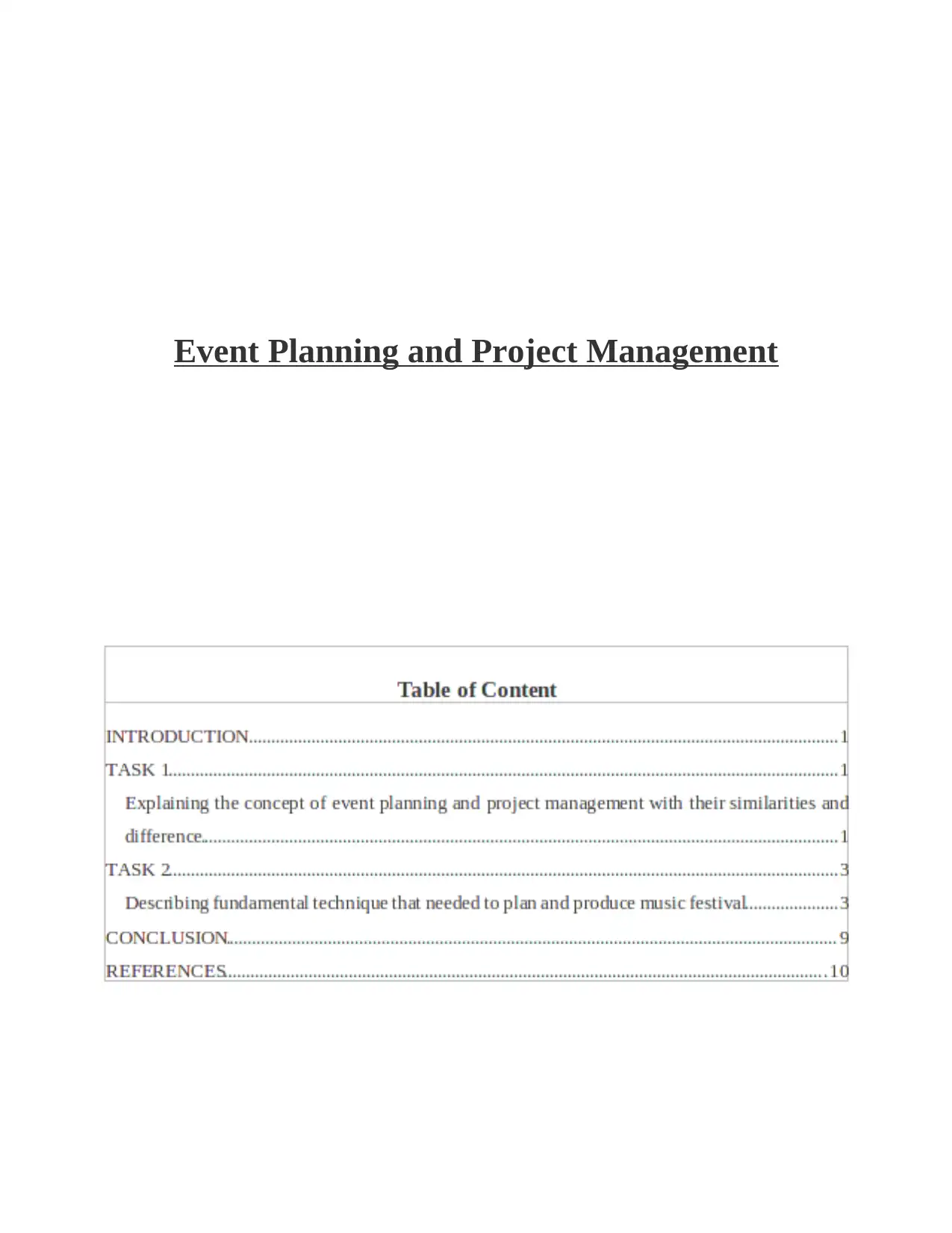
Event Planning and Project Management
Paraphrase This Document
Need a fresh take? Get an instant paraphrase of this document with our AI Paraphraser
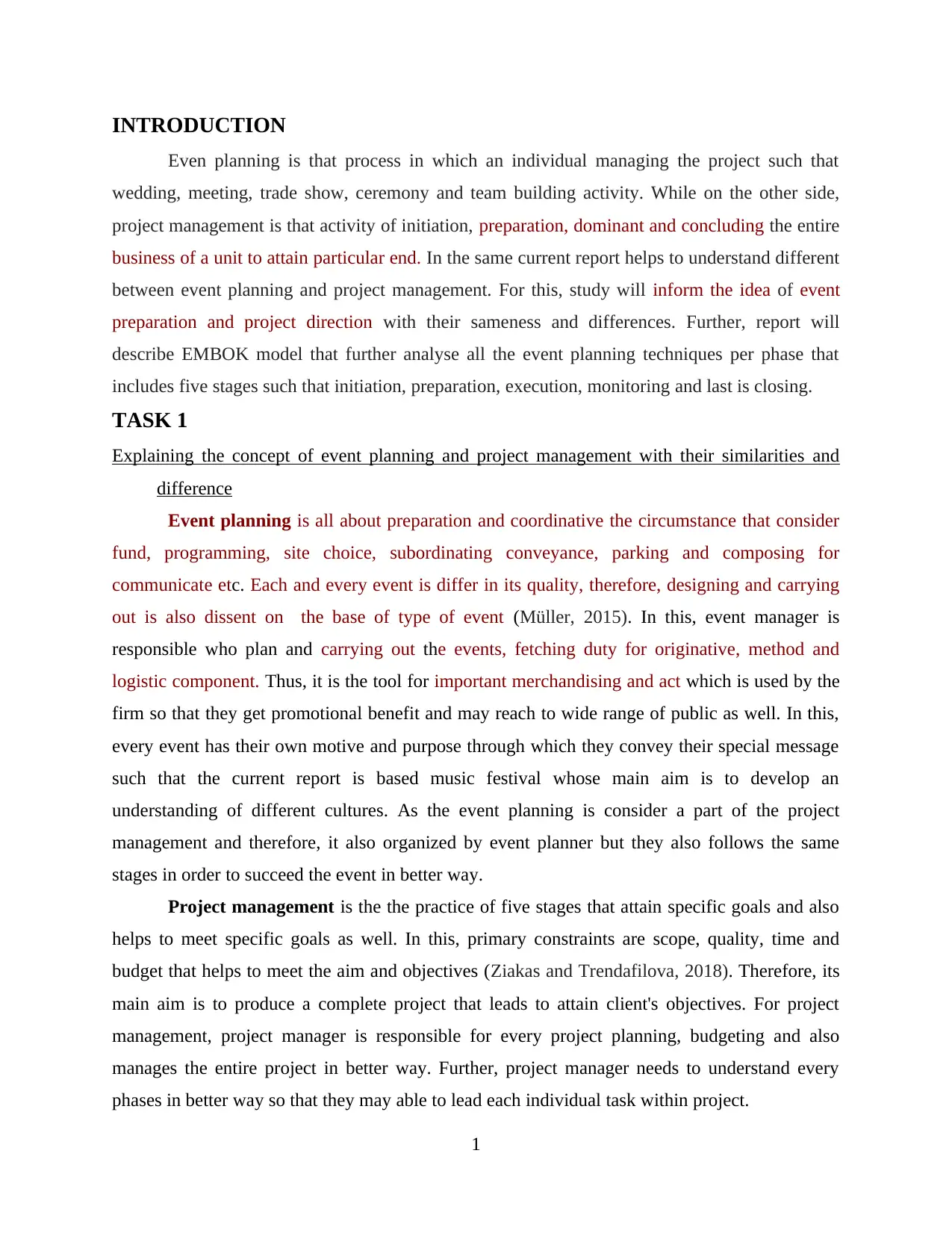
INTRODUCTION
Even planning is that process in which an individual managing the project such that
wedding, meeting, trade show, ceremony and team building activity. While on the other side,
project management is that activity of initiation, preparation, dominant and concluding the entire
business of a unit to attain particular end. In the same current report helps to understand different
between event planning and project management. For this, study will inform the idea of event
preparation and project direction with their sameness and differences. Further, report will
describe EMBOK model that further analyse all the event planning techniques per phase that
includes five stages such that initiation, preparation, execution, monitoring and last is closing.
TASK 1
Explaining the concept of event planning and project management with their similarities and
difference
Event planning is all about preparation and coordinative the circumstance that consider
fund, programming, site choice, subordinating conveyance, parking and composing for
communicate etc. Each and every event is differ in its quality, therefore, designing and carrying
out is also dissent on the base of type of event (Müller, 2015). In this, event manager is
responsible who plan and carrying out the events, fetching duty for originative, method and
logistic component. Thus, it is the tool for important merchandising and act which is used by the
firm so that they get promotional benefit and may reach to wide range of public as well. In this,
every event has their own motive and purpose through which they convey their special message
such that the current report is based music festival whose main aim is to develop an
understanding of different cultures. As the event planning is consider a part of the project
management and therefore, it also organized by event planner but they also follows the same
stages in order to succeed the event in better way.
Project management is the the practice of five stages that attain specific goals and also
helps to meet specific goals as well. In this, primary constraints are scope, quality, time and
budget that helps to meet the aim and objectives (Ziakas and Trendafilova, 2018). Therefore, its
main aim is to produce a complete project that leads to attain client's objectives. For project
management, project manager is responsible for every project planning, budgeting and also
manages the entire project in better way. Further, project manager needs to understand every
phases in better way so that they may able to lead each individual task within project.
1
Even planning is that process in which an individual managing the project such that
wedding, meeting, trade show, ceremony and team building activity. While on the other side,
project management is that activity of initiation, preparation, dominant and concluding the entire
business of a unit to attain particular end. In the same current report helps to understand different
between event planning and project management. For this, study will inform the idea of event
preparation and project direction with their sameness and differences. Further, report will
describe EMBOK model that further analyse all the event planning techniques per phase that
includes five stages such that initiation, preparation, execution, monitoring and last is closing.
TASK 1
Explaining the concept of event planning and project management with their similarities and
difference
Event planning is all about preparation and coordinative the circumstance that consider
fund, programming, site choice, subordinating conveyance, parking and composing for
communicate etc. Each and every event is differ in its quality, therefore, designing and carrying
out is also dissent on the base of type of event (Müller, 2015). In this, event manager is
responsible who plan and carrying out the events, fetching duty for originative, method and
logistic component. Thus, it is the tool for important merchandising and act which is used by the
firm so that they get promotional benefit and may reach to wide range of public as well. In this,
every event has their own motive and purpose through which they convey their special message
such that the current report is based music festival whose main aim is to develop an
understanding of different cultures. As the event planning is consider a part of the project
management and therefore, it also organized by event planner but they also follows the same
stages in order to succeed the event in better way.
Project management is the the practice of five stages that attain specific goals and also
helps to meet specific goals as well. In this, primary constraints are scope, quality, time and
budget that helps to meet the aim and objectives (Ziakas and Trendafilova, 2018). Therefore, its
main aim is to produce a complete project that leads to attain client's objectives. For project
management, project manager is responsible for every project planning, budgeting and also
manages the entire project in better way. Further, project manager needs to understand every
phases in better way so that they may able to lead each individual task within project.
1
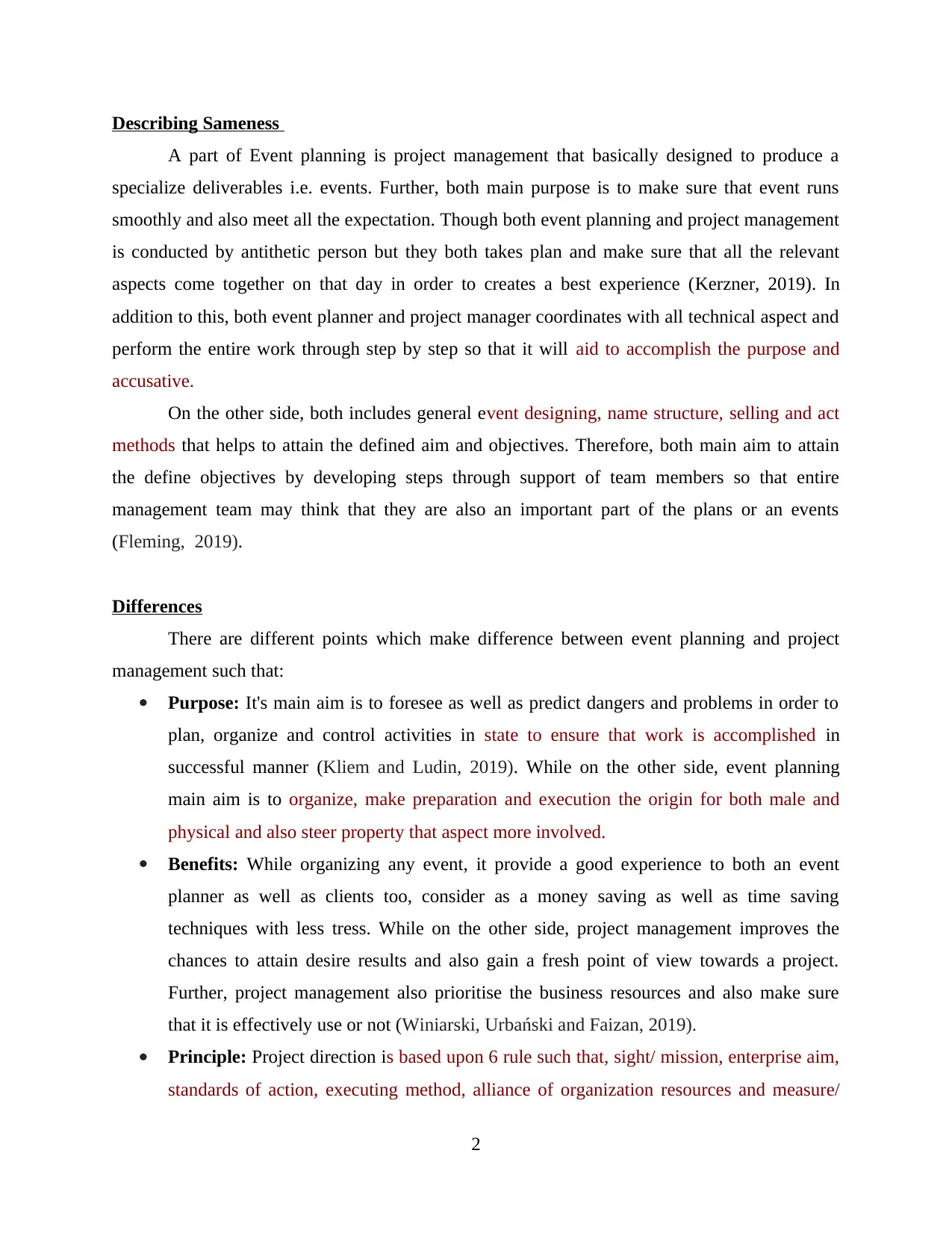
Describing Sameness
A part of Event planning is project management that basically designed to produce a
specialize deliverables i.e. events. Further, both main purpose is to make sure that event runs
smoothly and also meet all the expectation. Though both event planning and project management
is conducted by antithetic person but they both takes plan and make sure that all the relevant
aspects come together on that day in order to creates a best experience (Kerzner, 2019). In
addition to this, both event planner and project manager coordinates with all technical aspect and
perform the entire work through step by step so that it will aid to accomplish the purpose and
accusative.
On the other side, both includes general event designing, name structure, selling and act
methods that helps to attain the defined aim and objectives. Therefore, both main aim to attain
the define objectives by developing steps through support of team members so that entire
management team may think that they are also an important part of the plans or an events
(Fleming, 2019).
Differences
There are different points which make difference between event planning and project
management such that:
Purpose: It's main aim is to foresee as well as predict dangers and problems in order to
plan, organize and control activities in state to ensure that work is accomplished in
successful manner (Kliem and Ludin, 2019). While on the other side, event planning
main aim is to organize, make preparation and execution the origin for both male and
physical and also steer property that aspect more involved.
Benefits: While organizing any event, it provide a good experience to both an event
planner as well as clients too, consider as a money saving as well as time saving
techniques with less tress. While on the other side, project management improves the
chances to attain desire results and also gain a fresh point of view towards a project.
Further, project management also prioritise the business resources and also make sure
that it is effectively use or not (Winiarski, Urbański and Faizan, 2019).
Principle: Project direction is based upon 6 rule such that, sight/ mission, enterprise aim,
standards of action, executing method, alliance of organization resources and measure/
2
A part of Event planning is project management that basically designed to produce a
specialize deliverables i.e. events. Further, both main purpose is to make sure that event runs
smoothly and also meet all the expectation. Though both event planning and project management
is conducted by antithetic person but they both takes plan and make sure that all the relevant
aspects come together on that day in order to creates a best experience (Kerzner, 2019). In
addition to this, both event planner and project manager coordinates with all technical aspect and
perform the entire work through step by step so that it will aid to accomplish the purpose and
accusative.
On the other side, both includes general event designing, name structure, selling and act
methods that helps to attain the defined aim and objectives. Therefore, both main aim to attain
the define objectives by developing steps through support of team members so that entire
management team may think that they are also an important part of the plans or an events
(Fleming, 2019).
Differences
There are different points which make difference between event planning and project
management such that:
Purpose: It's main aim is to foresee as well as predict dangers and problems in order to
plan, organize and control activities in state to ensure that work is accomplished in
successful manner (Kliem and Ludin, 2019). While on the other side, event planning
main aim is to organize, make preparation and execution the origin for both male and
physical and also steer property that aspect more involved.
Benefits: While organizing any event, it provide a good experience to both an event
planner as well as clients too, consider as a money saving as well as time saving
techniques with less tress. While on the other side, project management improves the
chances to attain desire results and also gain a fresh point of view towards a project.
Further, project management also prioritise the business resources and also make sure
that it is effectively use or not (Winiarski, Urbański and Faizan, 2019).
Principle: Project direction is based upon 6 rule such that, sight/ mission, enterprise aim,
standards of action, executing method, alliance of organization resources and measure/
2
⊘ This is a preview!⊘
Do you want full access?
Subscribe today to unlock all pages.

Trusted by 1+ million students worldwide
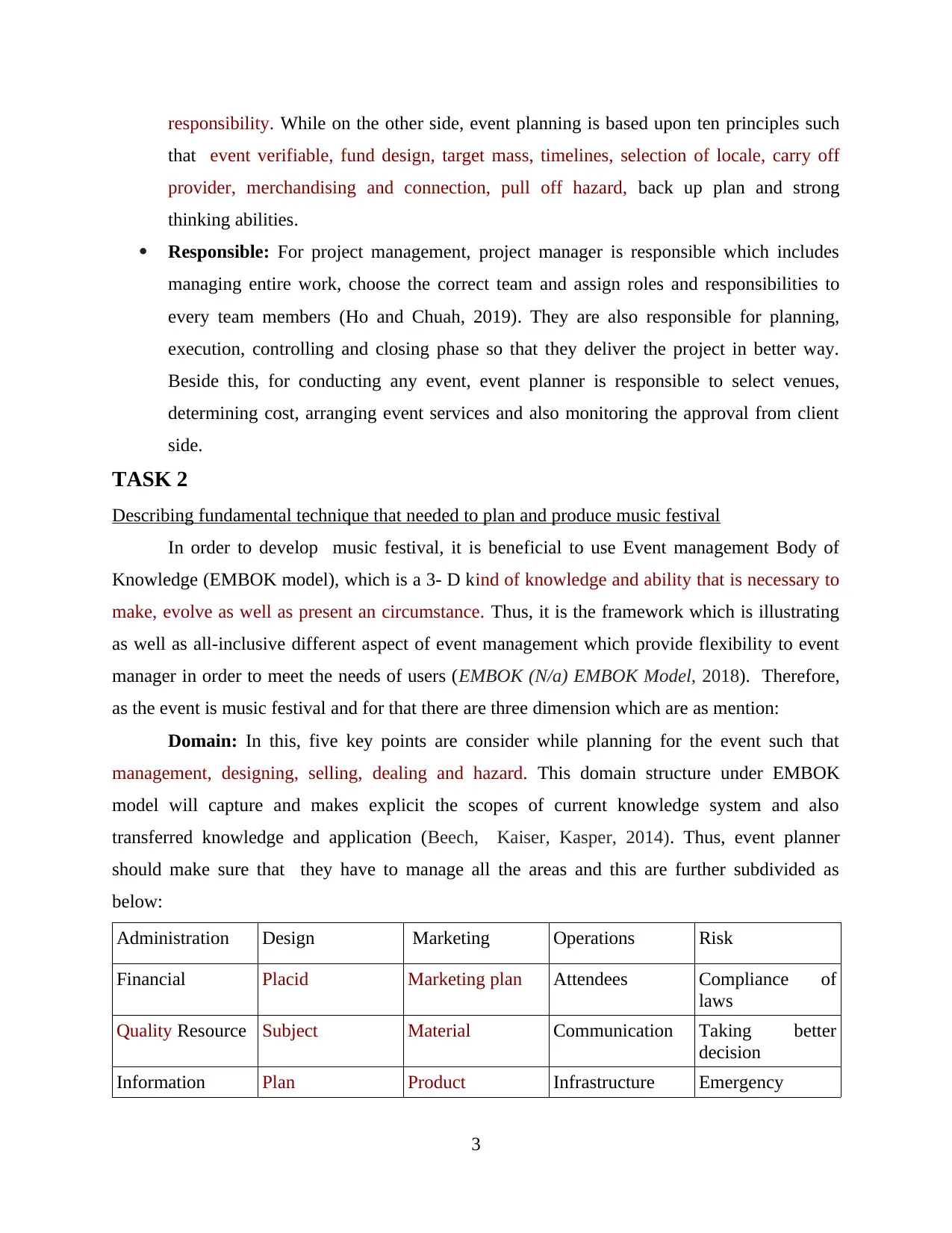
responsibility. While on the other side, event planning is based upon ten principles such
that event verifiable, fund design, target mass, timelines, selection of locale, carry off
provider, merchandising and connection, pull off hazard, back up plan and strong
thinking abilities.
Responsible: For project management, project manager is responsible which includes
managing entire work, choose the correct team and assign roles and responsibilities to
every team members (Ho and Chuah, 2019). They are also responsible for planning,
execution, controlling and closing phase so that they deliver the project in better way.
Beside this, for conducting any event, event planner is responsible to select venues,
determining cost, arranging event services and also monitoring the approval from client
side.
TASK 2
Describing fundamental technique that needed to plan and produce music festival
In order to develop music festival, it is beneficial to use Event management Body of
Knowledge (EMBOK model), which is a 3- D kind of knowledge and ability that is necessary to
make, evolve as well as present an circumstance. Thus, it is the framework which is illustrating
as well as all-inclusive different aspect of event management which provide flexibility to event
manager in order to meet the needs of users (EMBOK (N/a) EMBOK Model, 2018). Therefore,
as the event is music festival and for that there are three dimension which are as mention:
Domain: In this, five key points are consider while planning for the event such that
management, designing, selling, dealing and hazard. This domain structure under EMBOK
model will capture and makes explicit the scopes of current knowledge system and also
transferred knowledge and application (Beech, Kaiser, Kasper, 2014). Thus, event planner
should make sure that they have to manage all the areas and this are further subdivided as
below:
Administration Design Marketing Operations Risk
Financial Placid Marketing plan Attendees Compliance of
laws
Quality Resource Subject Material Communication Taking better
decision
Information Plan Product Infrastructure Emergency
3
that event verifiable, fund design, target mass, timelines, selection of locale, carry off
provider, merchandising and connection, pull off hazard, back up plan and strong
thinking abilities.
Responsible: For project management, project manager is responsible which includes
managing entire work, choose the correct team and assign roles and responsibilities to
every team members (Ho and Chuah, 2019). They are also responsible for planning,
execution, controlling and closing phase so that they deliver the project in better way.
Beside this, for conducting any event, event planner is responsible to select venues,
determining cost, arranging event services and also monitoring the approval from client
side.
TASK 2
Describing fundamental technique that needed to plan and produce music festival
In order to develop music festival, it is beneficial to use Event management Body of
Knowledge (EMBOK model), which is a 3- D kind of knowledge and ability that is necessary to
make, evolve as well as present an circumstance. Thus, it is the framework which is illustrating
as well as all-inclusive different aspect of event management which provide flexibility to event
manager in order to meet the needs of users (EMBOK (N/a) EMBOK Model, 2018). Therefore,
as the event is music festival and for that there are three dimension which are as mention:
Domain: In this, five key points are consider while planning for the event such that
management, designing, selling, dealing and hazard. This domain structure under EMBOK
model will capture and makes explicit the scopes of current knowledge system and also
transferred knowledge and application (Beech, Kaiser, Kasper, 2014). Thus, event planner
should make sure that they have to manage all the areas and this are further subdivided as
below:
Administration Design Marketing Operations Risk
Financial Placid Marketing plan Attendees Compliance of
laws
Quality Resource Subject Material Communication Taking better
decision
Information Plan Product Infrastructure Emergency
3
Paraphrase This Document
Need a fresh take? Get an instant paraphrase of this document with our AI Paraphraser
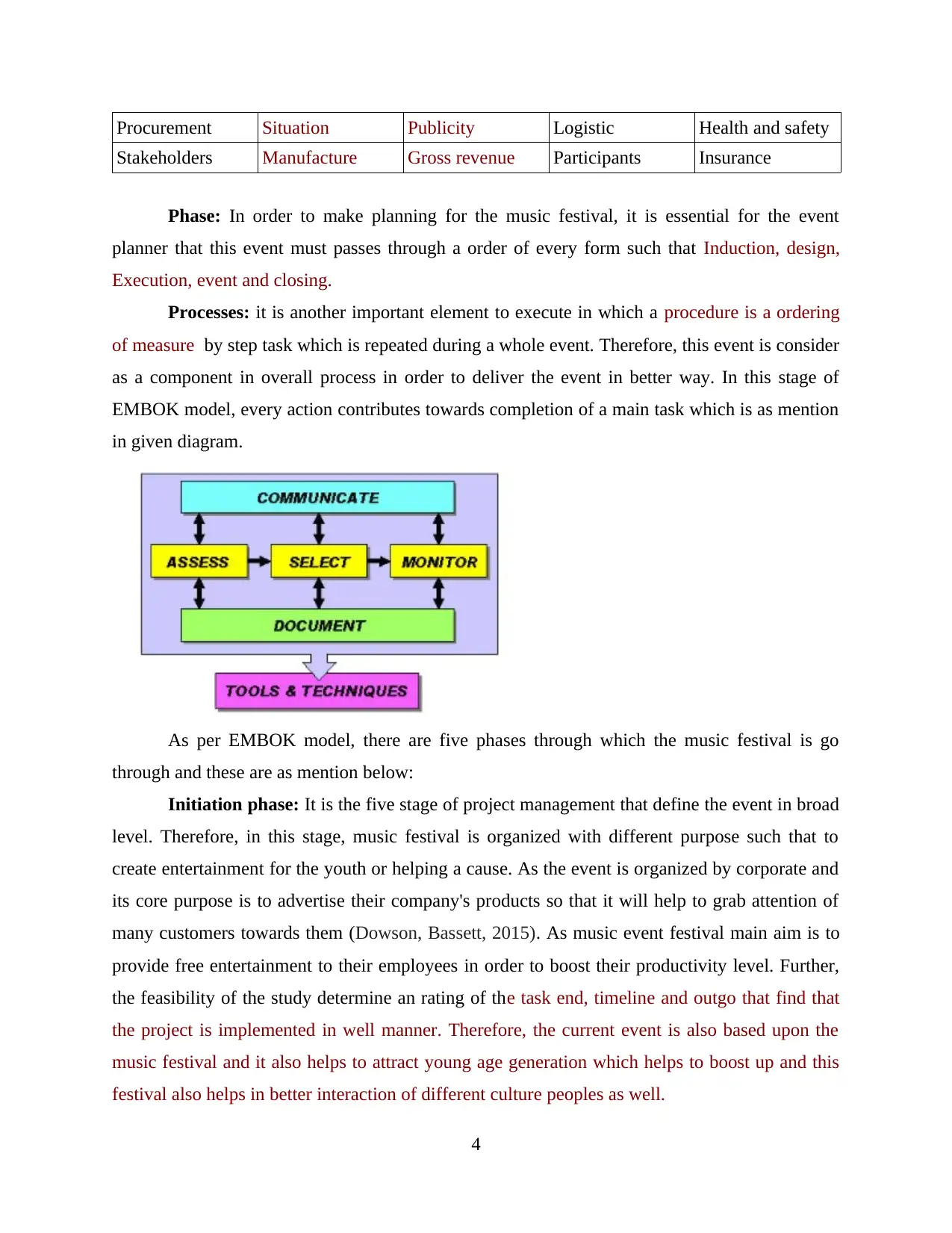
Procurement Situation Publicity Logistic Health and safety
Stakeholders Manufacture Gross revenue Participants Insurance
Phase: In order to make planning for the music festival, it is essential for the event
planner that this event must passes through a order of every form such that Induction, design,
Execution, event and closing.
Processes: it is another important element to execute in which a procedure is a ordering
of measure by step task which is repeated during a whole event. Therefore, this event is consider
as a component in overall process in order to deliver the event in better way. In this stage of
EMBOK model, every action contributes towards completion of a main task which is as mention
in given diagram.
As per EMBOK model, there are five phases through which the music festival is go
through and these are as mention below:
Initiation phase: It is the five stage of project management that define the event in broad
level. Therefore, in this stage, music festival is organized with different purpose such that to
create entertainment for the youth or helping a cause. As the event is organized by corporate and
its core purpose is to advertise their company's products so that it will help to grab attention of
many customers towards them (Dowson, Bassett, 2015). As music event festival main aim is to
provide free entertainment to their employees in order to boost their productivity level. Further,
the feasibility of the study determine an rating of the task end, timeline and outgo that find that
the project is implemented in well manner. Therefore, the current event is also based upon the
music festival and it also helps to attract young age generation which helps to boost up and this
festival also helps in better interaction of different culture peoples as well.
4
Stakeholders Manufacture Gross revenue Participants Insurance
Phase: In order to make planning for the music festival, it is essential for the event
planner that this event must passes through a order of every form such that Induction, design,
Execution, event and closing.
Processes: it is another important element to execute in which a procedure is a ordering
of measure by step task which is repeated during a whole event. Therefore, this event is consider
as a component in overall process in order to deliver the event in better way. In this stage of
EMBOK model, every action contributes towards completion of a main task which is as mention
in given diagram.
As per EMBOK model, there are five phases through which the music festival is go
through and these are as mention below:
Initiation phase: It is the five stage of project management that define the event in broad
level. Therefore, in this stage, music festival is organized with different purpose such that to
create entertainment for the youth or helping a cause. As the event is organized by corporate and
its core purpose is to advertise their company's products so that it will help to grab attention of
many customers towards them (Dowson, Bassett, 2015). As music event festival main aim is to
provide free entertainment to their employees in order to boost their productivity level. Further,
the feasibility of the study determine an rating of the task end, timeline and outgo that find that
the project is implemented in well manner. Therefore, the current event is also based upon the
music festival and it also helps to attract young age generation which helps to boost up and this
festival also helps in better interaction of different culture peoples as well.
4
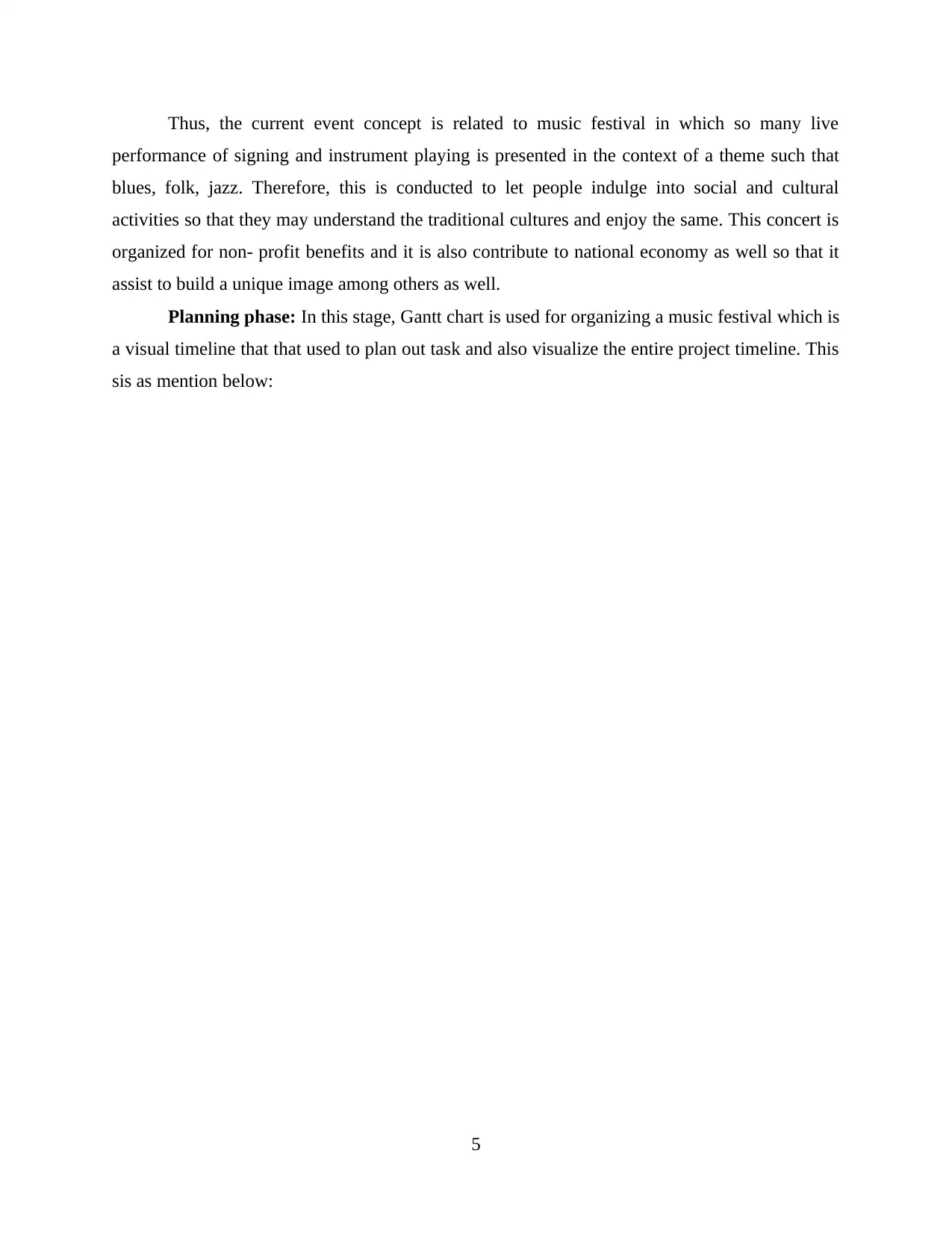
Thus, the current event concept is related to music festival in which so many live
performance of signing and instrument playing is presented in the context of a theme such that
blues, folk, jazz. Therefore, this is conducted to let people indulge into social and cultural
activities so that they may understand the traditional cultures and enjoy the same. This concert is
organized for non- profit benefits and it is also contribute to national economy as well so that it
assist to build a unique image among others as well.
Planning phase: In this stage, Gantt chart is used for organizing a music festival which is
a visual timeline that that used to plan out task and also visualize the entire project timeline. This
sis as mention below:
5
performance of signing and instrument playing is presented in the context of a theme such that
blues, folk, jazz. Therefore, this is conducted to let people indulge into social and cultural
activities so that they may understand the traditional cultures and enjoy the same. This concert is
organized for non- profit benefits and it is also contribute to national economy as well so that it
assist to build a unique image among others as well.
Planning phase: In this stage, Gantt chart is used for organizing a music festival which is
a visual timeline that that used to plan out task and also visualize the entire project timeline. This
sis as mention below:
5
⊘ This is a preview!⊘
Do you want full access?
Subscribe today to unlock all pages.

Trusted by 1+ million students worldwide

S.no Task Name Duration Start Finish Predecessors
1 Set Objectives 1 day Mon 11/18/19 Mon 11/18/19
2 Set venue 2 days Tue 11/19/19 Wed 11/20/19 1
3 Event agenda 1 day Thu 11/21/19 Thu 11/21/19 1,2
4 Sponsorship 2 days Fri 11/22/19 Mon 11/25/19 2,3
5 Budget 2 days Tue 11/26/19 Wed 11/27/19 3,4
6 Marketing and
promotion 3 days Thu 11/28/19 Mon 12/2/19 3,5
7 Sending
invitation 4 days Fri 11/22/19 Wed 11/27/19 3
8 Contracts 2 days Thu 11/28/19 Fri 11/29/19 7
9
Risk
management
strategies
2 days Mon 12/2/19 Tue 12/3/19 8
10 Security plan 2 days Wed 12/4/19 Thu 12/5/19 9
11
Waste
management
planning
3 days Fri 12/6/19 Tue 12/10/19 10
12 Post pictures 1 day Wed 12/11/19 Wed 12/11/19 11
13 Guest feedback 1 day Thu 12/12/19 Thu 12/12/19 12
6
1 Set Objectives 1 day Mon 11/18/19 Mon 11/18/19
2 Set venue 2 days Tue 11/19/19 Wed 11/20/19 1
3 Event agenda 1 day Thu 11/21/19 Thu 11/21/19 1,2
4 Sponsorship 2 days Fri 11/22/19 Mon 11/25/19 2,3
5 Budget 2 days Tue 11/26/19 Wed 11/27/19 3,4
6 Marketing and
promotion 3 days Thu 11/28/19 Mon 12/2/19 3,5
7 Sending
invitation 4 days Fri 11/22/19 Wed 11/27/19 3
8 Contracts 2 days Thu 11/28/19 Fri 11/29/19 7
9
Risk
management
strategies
2 days Mon 12/2/19 Tue 12/3/19 8
10 Security plan 2 days Wed 12/4/19 Thu 12/5/19 9
11
Waste
management
planning
3 days Fri 12/6/19 Tue 12/10/19 10
12 Post pictures 1 day Wed 12/11/19 Wed 12/11/19 11
13 Guest feedback 1 day Thu 12/12/19 Thu 12/12/19 12
6
Paraphrase This Document
Need a fresh take? Get an instant paraphrase of this document with our AI Paraphraser
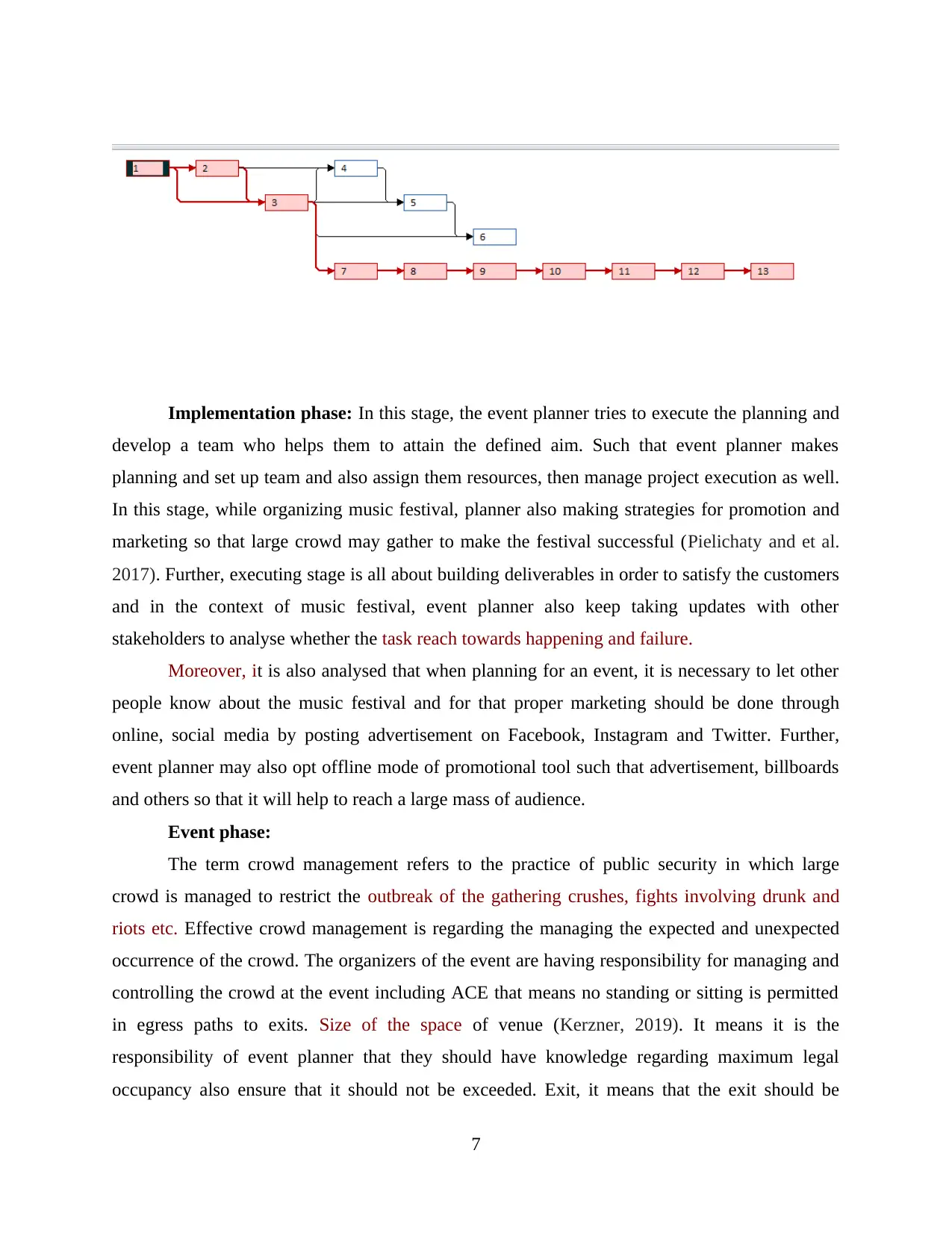
Implementation phase: In this stage, the event planner tries to execute the planning and
develop a team who helps them to attain the defined aim. Such that event planner makes
planning and set up team and also assign them resources, then manage project execution as well.
In this stage, while organizing music festival, planner also making strategies for promotion and
marketing so that large crowd may gather to make the festival successful (Pielichaty and et al.
2017). Further, executing stage is all about building deliverables in order to satisfy the customers
and in the context of music festival, event planner also keep taking updates with other
stakeholders to analyse whether the task reach towards happening and failure.
Moreover, it is also analysed that when planning for an event, it is necessary to let other
people know about the music festival and for that proper marketing should be done through
online, social media by posting advertisement on Facebook, Instagram and Twitter. Further,
event planner may also opt offline mode of promotional tool such that advertisement, billboards
and others so that it will help to reach a large mass of audience.
Event phase:
The term crowd management refers to the practice of public security in which large
crowd is managed to restrict the outbreak of the gathering crushes, fights involving drunk and
riots etc. Effective crowd management is regarding the managing the expected and unexpected
occurrence of the crowd. The organizers of the event are having responsibility for managing and
controlling the crowd at the event including ACE that means no standing or sitting is permitted
in egress paths to exits. Size of the space of venue (Kerzner, 2019). It means it is the
responsibility of event planner that they should have knowledge regarding maximum legal
occupancy also ensure that it should not be exceeded. Exit, it means that the exit should be
7
develop a team who helps them to attain the defined aim. Such that event planner makes
planning and set up team and also assign them resources, then manage project execution as well.
In this stage, while organizing music festival, planner also making strategies for promotion and
marketing so that large crowd may gather to make the festival successful (Pielichaty and et al.
2017). Further, executing stage is all about building deliverables in order to satisfy the customers
and in the context of music festival, event planner also keep taking updates with other
stakeholders to analyse whether the task reach towards happening and failure.
Moreover, it is also analysed that when planning for an event, it is necessary to let other
people know about the music festival and for that proper marketing should be done through
online, social media by posting advertisement on Facebook, Instagram and Twitter. Further,
event planner may also opt offline mode of promotional tool such that advertisement, billboards
and others so that it will help to reach a large mass of audience.
Event phase:
The term crowd management refers to the practice of public security in which large
crowd is managed to restrict the outbreak of the gathering crushes, fights involving drunk and
riots etc. Effective crowd management is regarding the managing the expected and unexpected
occurrence of the crowd. The organizers of the event are having responsibility for managing and
controlling the crowd at the event including ACE that means no standing or sitting is permitted
in egress paths to exits. Size of the space of venue (Kerzner, 2019). It means it is the
responsibility of event planner that they should have knowledge regarding maximum legal
occupancy also ensure that it should not be exceeded. Exit, it means that the exit should be
7
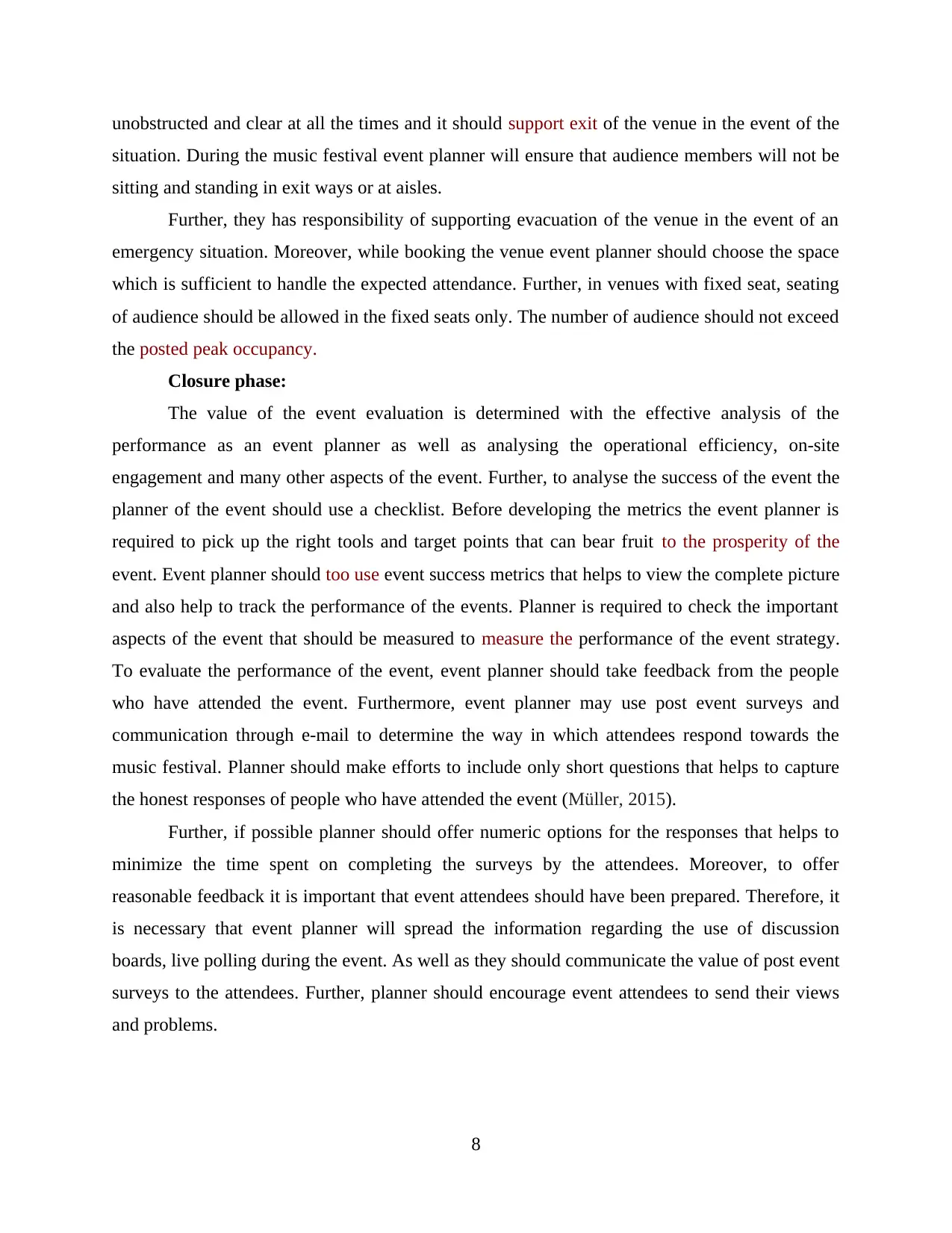
unobstructed and clear at all the times and it should support exit of the venue in the event of the
situation. During the music festival event planner will ensure that audience members will not be
sitting and standing in exit ways or at aisles.
Further, they has responsibility of supporting evacuation of the venue in the event of an
emergency situation. Moreover, while booking the venue event planner should choose the space
which is sufficient to handle the expected attendance. Further, in venues with fixed seat, seating
of audience should be allowed in the fixed seats only. The number of audience should not exceed
the posted peak occupancy.
Closure phase:
The value of the event evaluation is determined with the effective analysis of the
performance as an event planner as well as analysing the operational efficiency, on-site
engagement and many other aspects of the event. Further, to analyse the success of the event the
planner of the event should use a checklist. Before developing the metrics the event planner is
required to pick up the right tools and target points that can bear fruit to the prosperity of the
event. Event planner should too use event success metrics that helps to view the complete picture
and also help to track the performance of the events. Planner is required to check the important
aspects of the event that should be measured to measure the performance of the event strategy.
To evaluate the performance of the event, event planner should take feedback from the people
who have attended the event. Furthermore, event planner may use post event surveys and
communication through e-mail to determine the way in which attendees respond towards the
music festival. Planner should make efforts to include only short questions that helps to capture
the honest responses of people who have attended the event (Müller, 2015).
Further, if possible planner should offer numeric options for the responses that helps to
minimize the time spent on completing the surveys by the attendees. Moreover, to offer
reasonable feedback it is important that event attendees should have been prepared. Therefore, it
is necessary that event planner will spread the information regarding the use of discussion
boards, live polling during the event. As well as they should communicate the value of post event
surveys to the attendees. Further, planner should encourage event attendees to send their views
and problems.
8
situation. During the music festival event planner will ensure that audience members will not be
sitting and standing in exit ways or at aisles.
Further, they has responsibility of supporting evacuation of the venue in the event of an
emergency situation. Moreover, while booking the venue event planner should choose the space
which is sufficient to handle the expected attendance. Further, in venues with fixed seat, seating
of audience should be allowed in the fixed seats only. The number of audience should not exceed
the posted peak occupancy.
Closure phase:
The value of the event evaluation is determined with the effective analysis of the
performance as an event planner as well as analysing the operational efficiency, on-site
engagement and many other aspects of the event. Further, to analyse the success of the event the
planner of the event should use a checklist. Before developing the metrics the event planner is
required to pick up the right tools and target points that can bear fruit to the prosperity of the
event. Event planner should too use event success metrics that helps to view the complete picture
and also help to track the performance of the events. Planner is required to check the important
aspects of the event that should be measured to measure the performance of the event strategy.
To evaluate the performance of the event, event planner should take feedback from the people
who have attended the event. Furthermore, event planner may use post event surveys and
communication through e-mail to determine the way in which attendees respond towards the
music festival. Planner should make efforts to include only short questions that helps to capture
the honest responses of people who have attended the event (Müller, 2015).
Further, if possible planner should offer numeric options for the responses that helps to
minimize the time spent on completing the surveys by the attendees. Moreover, to offer
reasonable feedback it is important that event attendees should have been prepared. Therefore, it
is necessary that event planner will spread the information regarding the use of discussion
boards, live polling during the event. As well as they should communicate the value of post event
surveys to the attendees. Further, planner should encourage event attendees to send their views
and problems.
8
⊘ This is a preview!⊘
Do you want full access?
Subscribe today to unlock all pages.

Trusted by 1+ million students worldwide
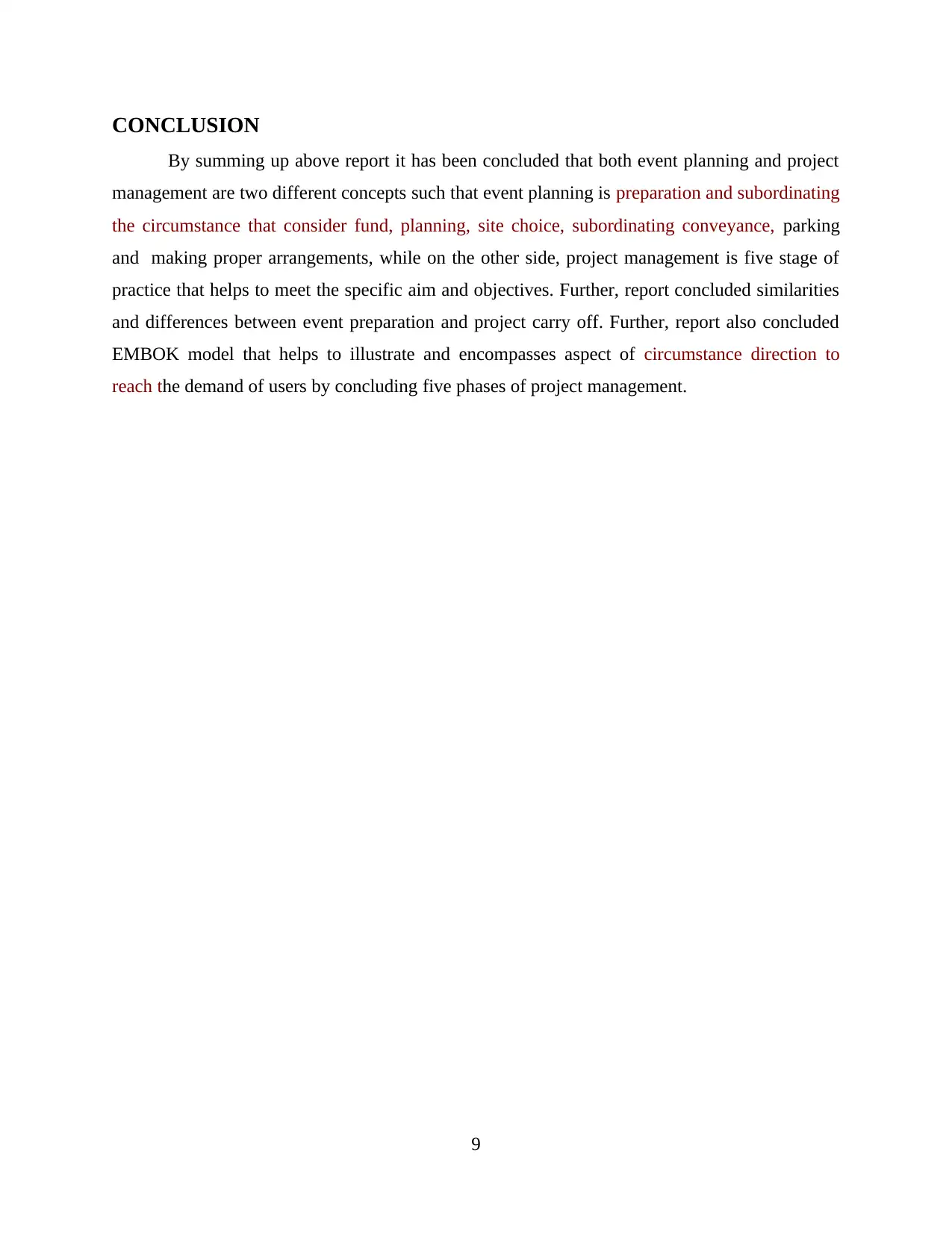
CONCLUSION
By summing up above report it has been concluded that both event planning and project
management are two different concepts such that event planning is preparation and subordinating
the circumstance that consider fund, planning, site choice, subordinating conveyance, parking
and making proper arrangements, while on the other side, project management is five stage of
practice that helps to meet the specific aim and objectives. Further, report concluded similarities
and differences between event preparation and project carry off. Further, report also concluded
EMBOK model that helps to illustrate and encompasses aspect of circumstance direction to
reach the demand of users by concluding five phases of project management.
9
By summing up above report it has been concluded that both event planning and project
management are two different concepts such that event planning is preparation and subordinating
the circumstance that consider fund, planning, site choice, subordinating conveyance, parking
and making proper arrangements, while on the other side, project management is five stage of
practice that helps to meet the specific aim and objectives. Further, report concluded similarities
and differences between event preparation and project carry off. Further, report also concluded
EMBOK model that helps to illustrate and encompasses aspect of circumstance direction to
reach the demand of users by concluding five phases of project management.
9
Paraphrase This Document
Need a fresh take? Get an instant paraphrase of this document with our AI Paraphraser
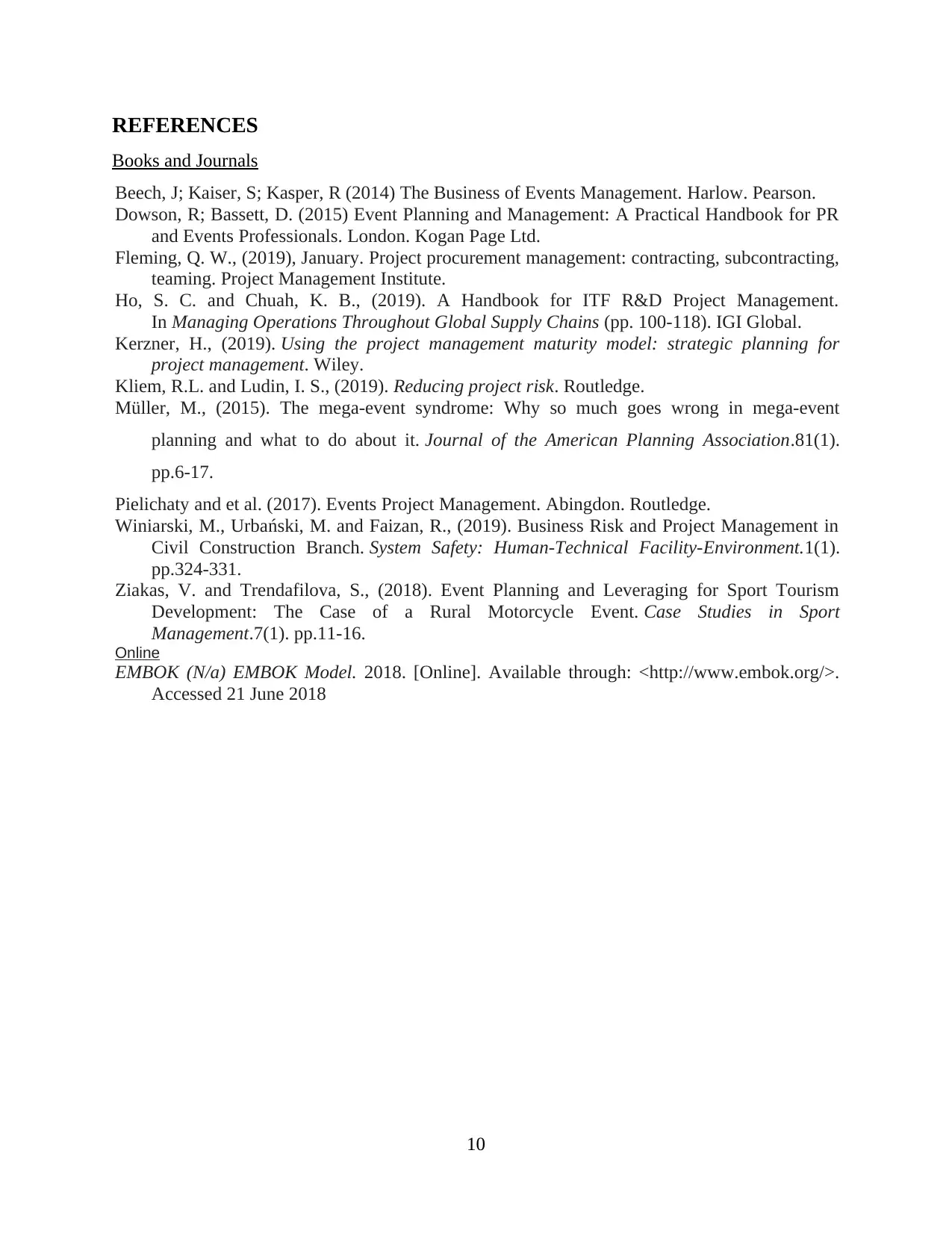
REFERENCES
Books and Journals
Beech, J; Kaiser, S; Kasper, R (2014) The Business of Events Management. Harlow. Pearson.
Dowson, R; Bassett, D. (2015) Event Planning and Management: A Practical Handbook for PR
and Events Professionals. London. Kogan Page Ltd.
Fleming, Q. W., (2019), January. Project procurement management: contracting, subcontracting,
teaming. Project Management Institute.
Ho, S. C. and Chuah, K. B., (2019). A Handbook for ITF R&D Project Management.
In Managing Operations Throughout Global Supply Chains (pp. 100-118). IGI Global.
Kerzner, H., (2019). Using the project management maturity model: strategic planning for
project management. Wiley.
Kliem, R.L. and Ludin, I. S., (2019). Reducing project risk. Routledge.
Müller, M., (2015). The mega-event syndrome: Why so much goes wrong in mega-event
planning and what to do about it. Journal of the American Planning Association.81(1).
pp.6-17.
Pielichaty and et al. (2017). Events Project Management. Abingdon. Routledge.
Winiarski, M., Urbański, M. and Faizan, R., (2019). Business Risk and Project Management in
Civil Construction Branch. System Safety: Human-Technical Facility-Environment.1(1).
pp.324-331.
Ziakas, V. and Trendafilova, S., (2018). Event Planning and Leveraging for Sport Tourism
Development: The Case of a Rural Motorcycle Event. Case Studies in Sport
Management.7(1). pp.11-16.
Online
EMBOK (N/a) EMBOK Model. 2018. [Online]. Available through: <http://www.embok.org/>.
Accessed 21 June 2018
10
Books and Journals
Beech, J; Kaiser, S; Kasper, R (2014) The Business of Events Management. Harlow. Pearson.
Dowson, R; Bassett, D. (2015) Event Planning and Management: A Practical Handbook for PR
and Events Professionals. London. Kogan Page Ltd.
Fleming, Q. W., (2019), January. Project procurement management: contracting, subcontracting,
teaming. Project Management Institute.
Ho, S. C. and Chuah, K. B., (2019). A Handbook for ITF R&D Project Management.
In Managing Operations Throughout Global Supply Chains (pp. 100-118). IGI Global.
Kerzner, H., (2019). Using the project management maturity model: strategic planning for
project management. Wiley.
Kliem, R.L. and Ludin, I. S., (2019). Reducing project risk. Routledge.
Müller, M., (2015). The mega-event syndrome: Why so much goes wrong in mega-event
planning and what to do about it. Journal of the American Planning Association.81(1).
pp.6-17.
Pielichaty and et al. (2017). Events Project Management. Abingdon. Routledge.
Winiarski, M., Urbański, M. and Faizan, R., (2019). Business Risk and Project Management in
Civil Construction Branch. System Safety: Human-Technical Facility-Environment.1(1).
pp.324-331.
Ziakas, V. and Trendafilova, S., (2018). Event Planning and Leveraging for Sport Tourism
Development: The Case of a Rural Motorcycle Event. Case Studies in Sport
Management.7(1). pp.11-16.
Online
EMBOK (N/a) EMBOK Model. 2018. [Online]. Available through: <http://www.embok.org/>.
Accessed 21 June 2018
10
1 out of 11
Related Documents
Your All-in-One AI-Powered Toolkit for Academic Success.
+13062052269
info@desklib.com
Available 24*7 on WhatsApp / Email
![[object Object]](/_next/static/media/star-bottom.7253800d.svg)
Unlock your academic potential
Copyright © 2020–2026 A2Z Services. All Rights Reserved. Developed and managed by ZUCOL.





